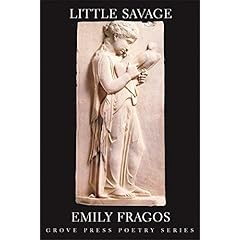
Main | 1

Emily Fragos’ Little Savage — A Spiritual Occupation
Fragos, Emily. Little Savage. Grove Press, 2004. (80 pages)
The beginning scholar, musician, sole athlete knows what it means to practice, practice, practice—the promise of moving forward. So too with writing. One practices the craft till one can open the gates. If disciplined, what follows is the trickle of originality. If gifted as well as persistent, what the writer may face is the gush of authenticity––and, sometimes, the near overwhelm of solitude.
Emily Fragos's first book Little Savage is stripped of any wild embellishment or distracting fashion. Its artistic and intuitive bank is the mysterious occupation of educated genius. Some say Poetry is inspired by blood pouring into or howling out of the earth; some say it is fomented by winged creatures that move unworshipped through the air.
Fragos—knowing fully well that poetry is a place where both the rational and irrational abides—steers clear of intellectual ironies and poetic fashions. Often her masks are a lone voice nearly overwhelmed by circumstance. In the poem "Increase of Appetite" she considers an array of salvaged birds:
...but what do they do but overwhelm one who is already
overwhelmed!
You do not know. They have their own rules and deaths
and routes
to follow––there above the darkening trees, there along
the hushed river,
there where no one yet has traced them to an Andean
mountaintop
like the Monarchs all gold and black and silently drumming.
If the food runs out, if the winter cold freezes them to
the hollow,
if there are those who fall behind or drift from the pattern
from weakness
or bad eyesight, the perils of predation, and fall away,
irretrievable––
A million stories I say to the birds; a million stories they sing
back to me.
Emily Dickinson, Antigone, Glenn Gould, Jacqueline du Pré, Maria Callas all are evoked in different poems. Her inventions enter spaces already created by Shakespeare, Velasquez, Vermeer, a spate of Greek myths.
Devise Cassandra. Become her, in possession....
Then breathe into her mouth the powered
Prophesy and for all you are losing
—the deprivation she will give and give__
Release her half gifted, as you are, half mortal.
("Apollo's Kiss")
But rather than be overwhelmed, the poet's power solely persists through—like the biblical character Noah:
...I have got going in the opposite direction
now, and whatever I may need, let it come—and soon,
you'll see, there will be no want of anything more.
All that was familiar is suddenly odd. As if a flood
had washed it all away. I remain, with one of everything.
("Noah")
And in another poem:
I bury my harm
in margins of woven nests,
aisles of unreadable texts...
Everything I cement together
like a frenzied animal,
winter and hunger approaching.
("In Margins")
It is in the poet being hobbled—perhaps even panicked—by her "half mortality" that gives Fragos the same dark drive as... say... the Spanish poet Garcia-Lorca; or even the French painter Henri Rosseau—the exhibited beast in its natural habitat, the divan lady in a jungle, or dreaming gypsy and lion in a desert landscape—each's existence cast in a vanishing light.
Once one knows that the world spins on its axis, one rationally—but incompletely—deduces, from personal experience, about effect:
...earth slowly revolving and no one falling off.
("Star Pharmacy")
At times the body seems tossed into the star whirlpool:
Someone hurled himself like a mounted acrobat
from a ledge into the empty air.
("While You Slept")
There are two worlds I know of:
the vast illumined
and the place where I am.
I need the other
the way a virus
needs a host....
("Host")
Fragos's poems are short, reaching, and refined. Her voice, erotic and unwavering, tempered by solitude. In one poem, "Il Maestro del Violino," the speaker is an orphaned Venetian child musician who has practiced her instrument but has little to anticipate in her moving forward:
One by one we pass away and are buried
under signs in the garden
behind. We can see the markers from
our windows and speak to our
friends who listen from above.
A degree of solitude fosters individuality and authenticity. Fragos's poems fulfill every expectation: artful, revealing, soulful, and full of empathy and passion. This is what happens when a heart that cares about the broken things of the world pumps ink onto the page. No stylish chicanery or pyrotechnics. Not fanciful spelling or self indulgence. Just heartful revelation and empathy for the world. In a world where posers fill shelves, Fragos is the real thing. In "Face," one of the poems most stripped of artistic allusion, the speaker is decidedly not Blake's Thell, but a tough-minded singer of experience:
The girl said the landlady was deranged,
and slapped her, set her German shepherd upon her
for no reason on the street. ...
I glared when she greeted me and passed
in silence. My face is freezing;
not like the girl's, though, with those eyes and mouth
that change blue and shape like a dancer
who can erase each figure with the next,
making space for forward only.
Scott Hightower's third book, Part of the Bargain, received Copper Canyon Press's 2004 Hayden Carruth Award. A native Texan, he now lives and works in New York City.
Boxcar Poetry Review - ISSN 1931-1761